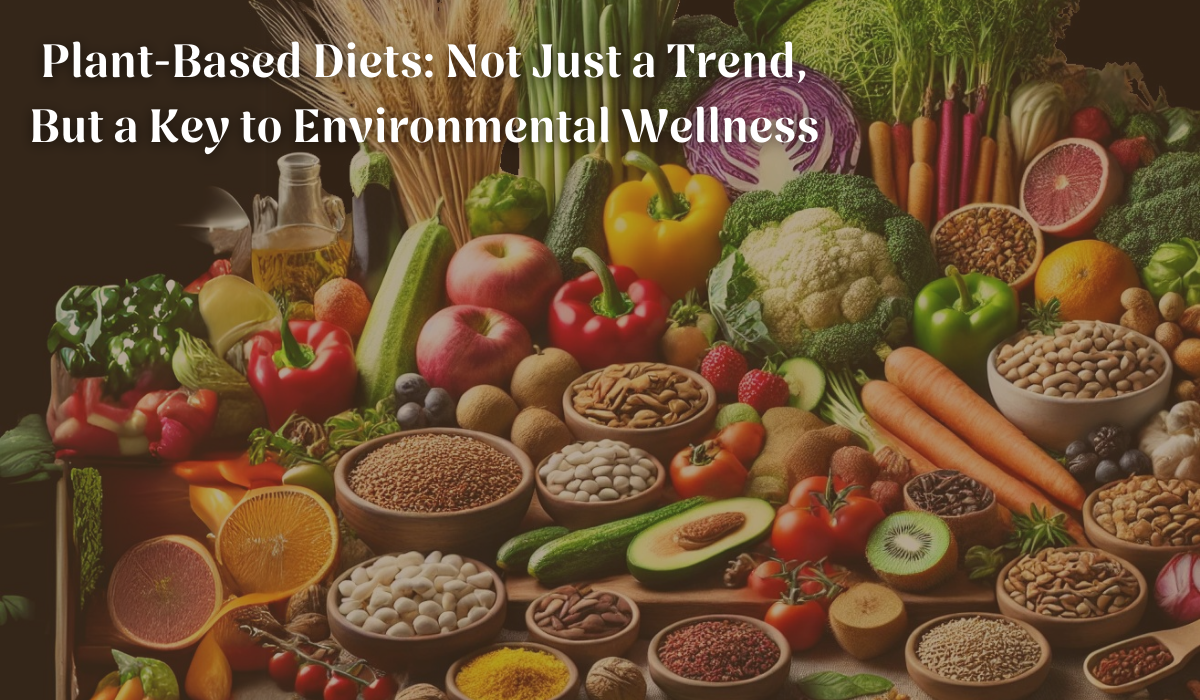The shift towards plant-based diets is more than just a global movement—it is a crucial step for environmental and public health. With a deep-rooted history of vegetarianism in many cultures, the benefits of plant-based eating have long been recognized. However, with the rise in industrial farming, changing food habits, and an increasing demand for meat and dairy, it’s time to reassess dietary choices for the sake of both personal health and environmental sustainability.
The Environmental Impact of Meat and Dairy
- Water Scarcity & Resource Drain
Many regions are already facing severe water shortages, and livestock farming is a major contributor. Producing just 1 kg of meat requires around 15,000 liters of water, while 1 kg of lentils requires only about 1,250 liters. By shifting to plant-based diets, valuable water resources can be conserved for future generations. - Deforestation & Loss of Agricultural Land
With an increasing demand for meat, large portions of forests and agricultural lands are being diverted for animal feed production. This not only reduces food availability for people but also threatens biodiversity, contributing to soil degradation and desertification. - Greenhouse Gas Emissions & Climate Change
Livestock farming significantly contributes to methane emissions, a greenhouse gas far more potent than CO₂. A plant-based diet can drastically reduce carbon footprints, making it a powerful tool in fighting climate change. - Pollution from Factory Farming
The rise of industrial-scale poultry and dairy farms has led to severe pollution of air and water sources. Animal waste runoff contaminates rivers, while ammonia emissions contribute to air pollution, worsening respiratory diseases in urban areas.
How a Plant-Based Diet Supports Economy & Food Security
- Improving Food Availability
Many populations still struggle with hunger and malnutrition, despite being large food producers. Instead of using grains to feed livestock, these resources could be directed toward feeding people more efficiently. Reducing meat consumption by just 10% could feed millions more people with plant-based foods. - Boosting Local Farmers & Sustainable Agriculture
Supporting traditional, small-scale farmers who grow pulses, millets, and seasonal vegetables strengthens the rural economy while promoting biodiversity. Millets like ragi, bajra, and jowar are not only nutritious but also require far less water compared to rice and wheat. - Reducing Healthcare Costs
With rising cases of lifestyle diseases like diabetes, heart disease, and obesity, plant-based diets can help reduce the burden on healthcare systems. Whole foods, rich in fiber and antioxidants, help prevent chronic illnesses and promote overall well-being.
The Health Benefits of a Plant-Based Diet
- Lower Risk of Chronic Diseases
There is an alarming rise in type-2 diabetes, hypertension, and heart disease, largely due to processed foods and high consumption of refined oils and meats. A plant-based diet, rich in fiber, antioxidants, and healthy fats, helps prevent these diseases. - Improved Gut Health
Traditional diets, rich in dals, fermented foods like idli and kanji, and fiber-packed vegetables, promote gut health and digestion. In contrast, excessive dairy and processed meats can lead to bloating, acidity, and gut disorders. - Better Weight Management
With obesity rates increasing in urban areas, switching to a plant-based diet can help in weight control without extreme dieting. Plant-based foods are naturally lower in calories and high in fiber, keeping you full longer and reducing unhealthy cravings. - Reduced Risk of Antibiotic Resistance
The poultry and dairy industries frequently use antibiotics to boost growth and prevent diseases in animals, leading to antibiotic-resistant bacteria. Cutting down on animal-based products can help mitigate this growing public health crisis.
Making the Shift: Practical Steps for a Plant-Based Diet
- Replace Meat with Protein-Rich Pulses & Legumes
Lentils (dal), chickpeas, rajma, and soya provide excellent plant-based protein without the environmental cost of animal products. - Choose Millets Over Refined Grains
Bajra, ragi, and jowar are nutrient-dense, gluten-free alternatives to refined wheat and rice, requiring less water and being more sustainable. - Embrace Traditional Plant-Based Recipes
Many cuisines already offer an abundance of vegetarian dishes—from chana masala and baingan bharta to sambar and khichdi. By focusing on whole, plant-based ingredients, we can honor culinary heritage while prioritizing health. - Reduce Dairy & Opt for Plant-Based Alternatives
Almond, coconut, and soy milk are excellent substitutes for dairy. Ghee, while culturally significant, can be consumed in moderation, and plant-based oils like mustard oil and groundnut oil can be healthier alternatives.
Conclusion: A Step Towards a Sustainable & Healthier Future
Switching to a plant-based diet isn’t just about following a trend—it’s about making mindful choices that benefit health, environment, and future generations. With a rich history of vegetarianism and an abundance of plant-based foods, embracing this shift is not just possible but deeply rooted in traditions. Every plant-based meal is a step towards a healthier you and a greener planet.
Are you ready to make the switch? Start small, experiment with flavors, and contribute to a better future—one meal at a time.

